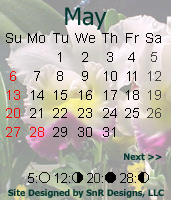
Welcome - Relay for Life Ahwatukee!
Relay For Life Ahwatukee is coming soon - the event is months away but the fun starts now!
Please contact Kathy McCulla, to get more information:
602.952.7537
email: kathy.mcculla@cancer.org
Relay for Life
Cancer Information
1.800.ACS.2345
American Cancer Society
Relay Beginnings
Relay For Life began in 1985 with Dr. Gordon Klatt, a Tacoma, Washington, surgeon and American Cancer Society volunteer.
Dr. Klatt, now a Relay For Life legend, ran and walked 81 miles in 24 hours at a local track and raised more than $27,000
for the Society. From this beginning, Relay For Life became an American Cancer Society signature event raising more
than $246 million in 2002 with more than 3,300 events in all 50 states and several countries!
Where the money goes...
Thousands of promising researchers have discovered many of cancer's secrets because of your contributions to the American Cancer
Society. Of these scientists, 32 have been awarded the Nobel Prize. Their work has helped improve the treatment and quality of life for
cancer patients.
We are winning
Sixty years ago, only one in five cancer patients survived. Today, more than half of the people with cancer will survive the disease.
There are more than eight million Americans alive today who have a history of cancer. Relay For Life is just one way the American
Cancer Society delivers this current, accurate message: with prevention and early detection-such as avoiding tobacco and sun exposure, choosing low-fat
diets and exercise, and obtaining appropriate cancer screenings-we can save lives!!!
FAQ's
Why is it overnight?
Relay For Life is a team event to fight cancer, an overnight celebration of life, benefiting the American Cancer Society.
Over the 17 years since the American Cancer Society Relay For Life's first lap was walked, volunteers and participants
have recognized a special bond that occurs when friends and neighbors spend time together joined toward completing a common
objective. Also, it is a symbolic demonstration that cancer doesn't sleep; cancer affect lives around the clock.
So, Relay For Life participants pledge to give one night.
What place do cancer survivors have at Relay For Life?
They have the place of honor as the special guests of the event. Besides being involved in teams, which many are,
survivors are invited through recruitment and through team association to walk the first lap as a sign of their victory.
They are also treated to a special reception to give them and their caregivers a chance to really absorb their moment of honor
and victory.
What do I have to do if I want to participate?
Gather together some friends, coworkers, neighbors, family members - ANYONE- and form a team.
Pay a registration fee, usually $10 per person, and then brainstorm your team's fundraising ideas. Raise dollars individually or as
a team and then plan the fun for the event by deciding your team's campsite needs. Each participant is encouraged to raise a minimum
of $100.
Do I have to walk the whole time?
No, this is a really. Just like the relay races of runners passing on the baton, this is a team event. Your team members take turns
throughout the hours of the event walking along the track. Depending on the size of your team-we recommend 10-15 team members-your team
members may have to walk a half hour or an hour.
Does the American Cancer Society staff plan the event?
No, Relay For Life is a volunteer-driven event. That means a committee of volunteers receives training from the staff and then plan their event
according to the personality of the community. Relay For Life events may look similar from town to town, but most take on the nature
of the community whether that be a university setting, a rural town or a metropolitan area. Joining the committee is a great way to have input
on what your Relay For Life will look like.
What is the luminaria ceremony all about?
personalized paper bags illuminated by candle are offered to friends, family and community members as a way to remember loved ones who have died from cancer
and honor those who are winning against the disease as survivors. A donation, usually $10, will allow a bag to be placed around the track
or walking area bearing the name of that loved one. Often, donors decorate the bags to further enhance the memorial or honor. It is one
way participants raise money for their teams.
What do participants do for all those hours?
Entertainment, games, food, fun and whatever else your team and committee chooses to do are among the menu of activities. There is always music, and
teams often do fundraiser activities right at their campsites to add to the carnival-type atmosphere.
Relay for Life
Cancer Information
1.800.ACS.2345
American Cancer Society
|



























